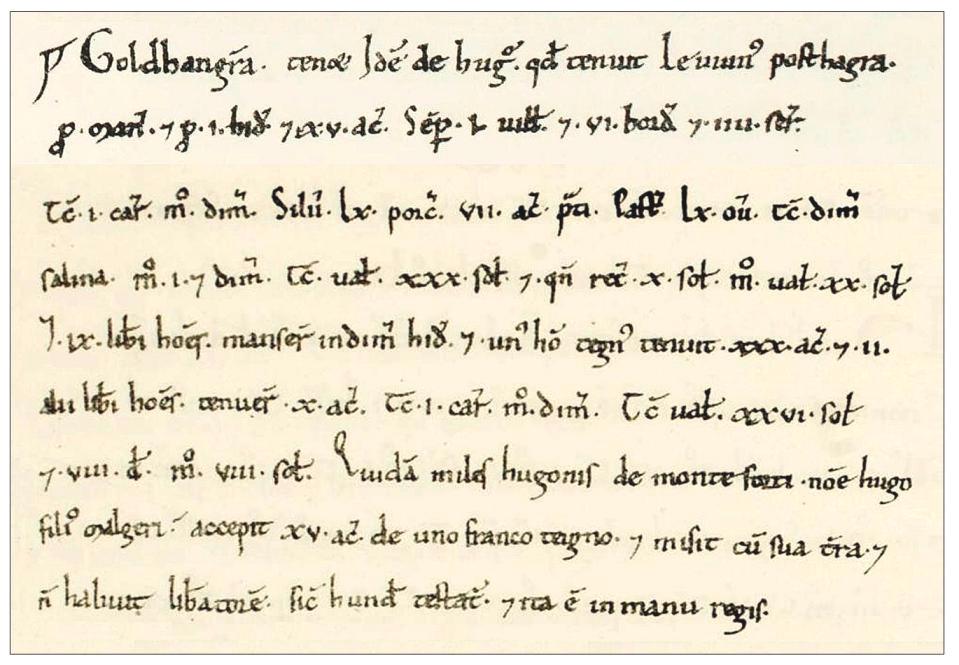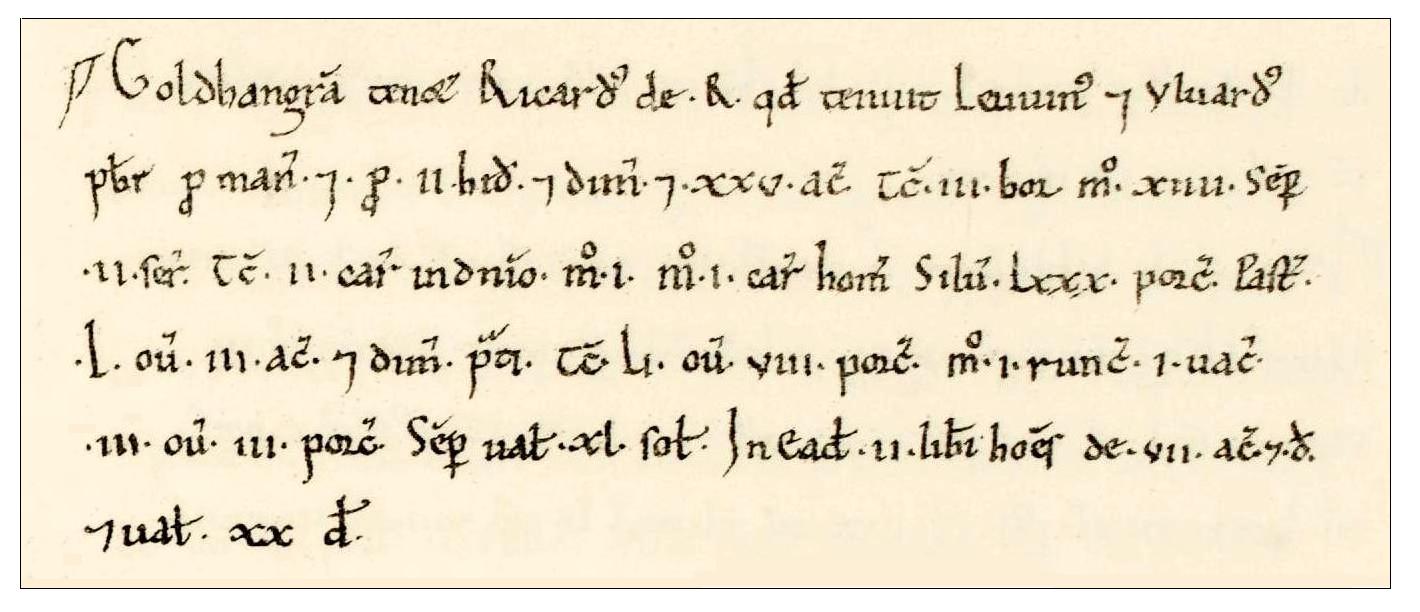
The
Domesday Book entries for Goldhanger
with translations and interpretations
The original Domesday book was not a single bound book. There was the "Little Domesday" covering Norfolk, Suffolk, and Essex, and the "Great Domesday" covering much of the rest of England. The original manuscripts were written in “Medieval Latin” and were store unbound in the Domesday Chest. The title “Domesday Book” translates into "the Book of Judgement".
Although originally commissioned by William the Conqueror and completed in 1086, the first complete bound version was not published until 1783. There have been several bound versions since then, the most resent being the Millennium version which was a limited edition of 450 “perfect facsimile copies” and bound in a replica of the earliest known binding. The complete book can also be read online at... https://opendomesday.org
There were three entries for Goldhanger in the Little Domesday Book as the entries were listed under the names of the land owners. It is interesting that the name of the village in the original Latin script is given two ways: Goldhangram and Goldangŕa. The name has been spelt many different ways since. See... Name of the Village
Lands of
Count Eustace in Essex
“Adelulf also holds GOLDHANGER from the Count, which
Alric held for 1 hide and 15 acres. Now 4 smallholders; then 2 slaves, now none.
Always 1 plough in lordship. Now ½ mens
plough. Woodland, 40 pigs; meadow, 3 acres; pasture, 50 sheep - Value then 20s;
now 30s”.
Land of
Hugh de Montfort
“He (Hugh son of Mauger) also holds GOLDHANGER from Hugh, which Leofwin (and) later Hager held as a manor, for 1 hide and 15 acres. Always 1 villager; 6 smallholders; 4 slaves. Then 1 plough, now ½ Woodland, 60 pigs; meadow, 7 acres; pasture, 60 sheep; then ½ salt-house, now l½. - Value then 30s; value now 20s. 9 free men dwelt on ½ hide. One man, a thane, held 30 acres and 2 other free men held 10 acres. Then 1 plough, now ½. - Value then 26s 8d; now 8s. One of Hugh de Montfort's men-at-arms, Hugh son of Mauger by name, acquired 15 acres from 1 free thane and put it with his own land. He did not have a deliverer, so the Hundred testifies; therefore it is in the King's hand”.
Lands of
Ranulf Peveral
“Richard holds GOLDHANGER from Ranulf, which Leofwin and Wulfward the priest held as a manor, for 2½ hides and 25 acres. Then 3 smallholders, now 14; always 2 slaves. Then 2 ploughs in lordship, now 1. Now 1 men's plough. Woodland, 80 pigs; pasture, 50 sheep; meadow, 3½ acres. Then 51 sheep, 8 pigs; now 1 cob, 1 cow, 3 sheep, 3 pigs. - Value always 40s. In the same (Goldhanger) 2 free men with 7½ acres. - Value 20d”.
_____________________
Who were the people referred
to in these Goldhanger entries?
Internet searches
give us clues to how these men came to own the lands…
Count Eustace fought at the Battle of Hastings (1066) and was rewarded with land in
England. At the Domesday Survey, Eustace held vast lands Cambridgeshire, Essex,
Hertfordshire, Huntingdonshire, Kent, Norfolk, Oxfordshire, Somerset, Suffolk
and Surrey; whilst Countess Ida of Boulogne held land in Dorset, Somerset and
Surrey.
Count Eustace - of Boulogne, he was married first to Goda, King Edward's sister (died c1056) and then to Ida of Lorraine. He was father of Godfrey of Boulogne and King Baldwin of Jerusalem.
At the time of the
Conquest Chipping Ongar became the principal property of Count Eustace of
Bolougne.
Coggeshall
Abbey was founded by Queen Matilda, wife of King Stephen, in about 1142 as a
house of the Savignac Order. She endowed it with the Manor of Coggeshall which
she had inherited from her father Count Eustace
of Essex.
The manor of Great Birch with Birch Castle
(sometimes referred to as Birch Hall) was held in 1066 by Edric, and afterwards
by Ingelric, and in 1086 of Count Eustace of
Boulogne by Hugh who held
Easthorpe of the count. Great Birch manor owned two houses in Colchester in
1086, which perhaps served as the lord's town houses, but their use declined
after the 11th century. The overlordship was still in the honor of Boulogne in
the 14th century.
The manor, known in the 11th century as Legra
(Layer), held in 1066 by Liwin, a free man, and in 1086 by Hugh de Montfort in demesne, can be identified as
William A Birches.
Ranulf Peverel was born 1030 in Normandy,
and died 1072 in Hatfield, Essex.
Hatfield Peverel Doomsday
Book entry:- Bishop of Bayeux; Ranulf Peverel and Serlo, Arnulf and
Richard from him. 5 men- at -arms. 2 mills. 5 cobs, 4 foals, 5 cows, 7 calves,
20 goats. The church is the nave of an ancient priory church founded by Ranulf Peverel.
Leofwin
Early records show the
name LEWIN to be derived from the Norman race, which were of Viking origin and
landed in the Orkneys and northern Scotland about 870 A D. The name appears in
England from about 1066 A D and its history is interwoven within the majestic
tapestry which contains the history of Britain.
The surname LEWIN emerged
as a notable family name in the county of Shropshire, where the family was
anciently seated. They were first recorded in 1010, when the Name Wilfricus
Filius Leofwini was recorded. The
doomsday book of 1086 included variations of the name such as Leuuin, Leuins ,
Lifwinus and Liuuinus Modernly Lewin. Members of the family figured prominently
in the Norman conquest, in particular leofwin, son of Godwin. A Commander
at Stamford bridge and Leofwin son of Hugh, a Freeman.
The family prospered in Shropshire and as individuals sought to pursue new
interests, branches of the family were established throughout England in
surrey, Lancaster, Yorkshire, Lincolnshire, Northamtonshire, Worcestershire,
Suffolk, Oxfordshire, Cambridgeshire, Northumberland and Essex.
In 1001 Danish forces invaded England, plundering, ravaging and burning, and
spreading terror and devastation. When they reached Alton, the men of Hampshire
came together and fought against them. About 81 English were killed, including
Ethelwerd the King's high-steward, Leofric of Whitchurch, Leofwin
the King's high-steward, Wulfhere a bishop's thane, and Godwin of Worthy,
Bishop Elfsy's son. Danish casualties were higher, but the Danes won the battle
and fleeing Englishmen took refuge in Winchester.
_____________________
top Descriptions of Goldhanger Virtual
Library home


